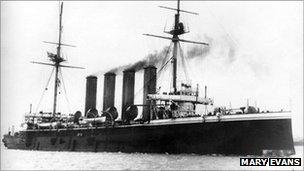Shipwreck salvage work on British warships condemned
- Published

HMS Aboukir was sunk early in WWI by a German submarine
Naval veterans' associations say that salvage work on three British warships is desecrating war graves.
HMS Aboukir, HMS Hogue and HMS Cressy were sunk 22 miles off the Dutch coast in 1914 by a German submarine and are the resting place of 1,500 sailors.
The Times says Dutch salvage vessels are now searching the cruisers for scrap metal.
But the International Maritime Confederation says that "our sailors should be allowed to rest in peace".
It has signed a letter in the newspaper, stating: "We, the presidents of associations of European naval veterans forming the International Maritime Confederation, suggest that no such desecration would take place in graves on land."
Vice Admiral John McAnally, president of the Royal Naval Association and president of the International Maritime Confederation, which includes European naval veterans' associations, said: "This is the resting place of 1,500 sailors, people like us.
"We think they should be treated with due care and respect, and not regarded as a source of profitable scrap metal."
Vice Adm McAnally said there would be "a tremendous fuss" if something like this happened on land.
He added: "The fact is sunken ships in international waters are under no jurisdiction. As I am aware, the government shares the same frustration as we do."
The vice admiral also said it was significant that two of the letter's signatories were from the Dutch and German naval veterans' associations.
"We are hoping for a response but we are not sure if we will get one," he said. "We feel we are doing our duty."
A spokesman for the Ministry of Defence said: "Her Majesty's government does not condone the unauthorised disturbance of any wreck containing human remains.
"The government continues to work closely with regional governments, with the aim of preventing inappropriate activity on military wrecks."